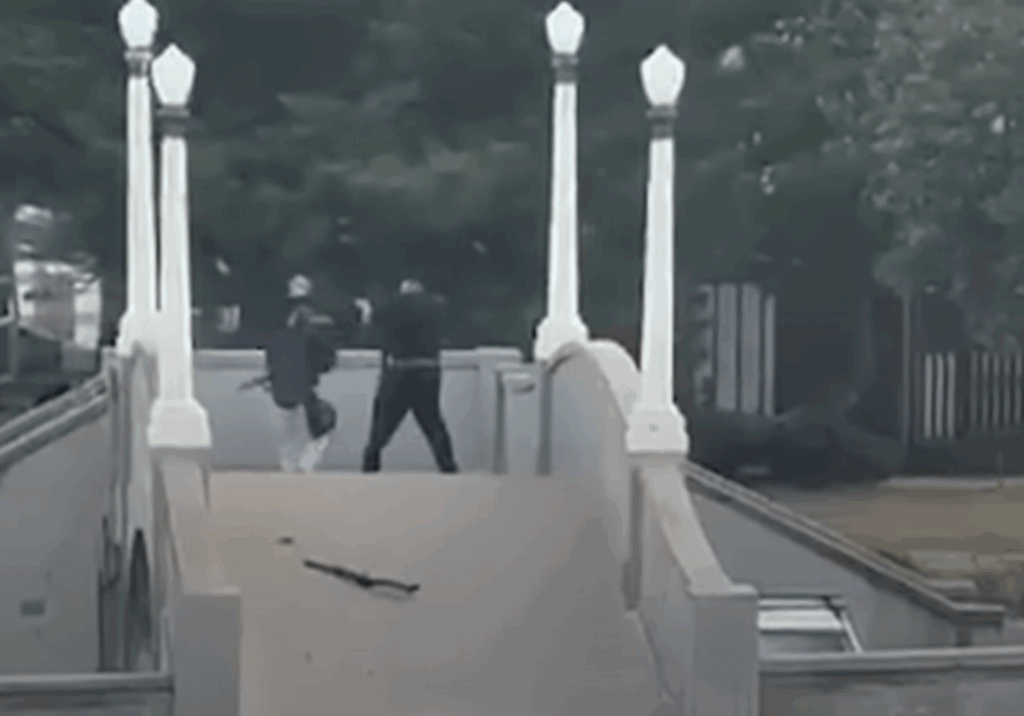Australia/Israel Review
Tariq or Treat
Feb 1, 2005 | Ted Lapkin
Tariq Ramadan’s “Goldfinger test”
By Ted Lapkin
 |
|
Ramadan: Failing the “Goldfinger Test” |
Tariq Ramadan is a smooth operator. This articulate Swiss-born professor of philosophy is arguably Europe’s leading Muslim intellectual. He recently visited Australia on a lecture tour.
Ramadan has been hailed by some as a shining beacon of progressivity and temperance who will serve as midwife to the rebirth of a new and moderate form of Islam.
But savoir-faire, even of James Bond-ian calibre, will only go so far in the face of damning evidence. And while Ramadan talks the talk of respectful coexistence between the Islamic world and the West, a mounting array of material demonstrates that he walks the walk of Muslim extremism.
Tariq Ramadan made international headlines last year when he was unable to take up an academic post he had been offered at Notre Dame University in Indiana. Ramadan was forced to relinquish his teaching appointment after the US Department of Homeland Security revoked his visa on the grounds of his links to radical Islamic terrorists.
And this was not the first time that Tariq Ramadan had been denied entry into a country on account of his extremist affiliations. In 1996, authorities banned Ramadan from entering France because of his connections to an Algerian Islamic underground group that had carried out bombings in Paris. Then in April 2002, a Spanish judge officially noted that an Algerian man under indictment as an al-Qaeda-banker had “routine contacts” with Tariq Ramadan. In November 2003, the Paris daily newspaper Le Monde revealed the contents of a Swiss intelligence report relating that Ramadan had met secretly a decade earlier with Osama bin Laden’s operations officer, Ayman al-Zawahiri. Even as far back as the early 1990s, al-Zawahiri had attracted the notice of security officials because of his involvement in the 1981 assassination by Islamic radicals of Egyptian President Anwar Sadat.
And to cap it all off, Geneva’s Le Temps newspaper broke a story last month connecting Ramadan to an al-Qaeda plot that targeted the US embassy in Paris. It seems that an itinerant Muslim preacher named Djamal Beghal had just been indicted for his leading role in this bombing conspiracy. And according to the official wording of this indictment, Beghal was serving as Tariq Ramadan’s teaching assistant during the period that this attack was in preparation.
But when Swiss journalist Sylvain Besson attempted to clarify the Ramadan-Beghal connection, he encountered the ‘duck and weave’ defence that Tariq Ramadan uses to evade inconvenient facts: “The Genevan intellectual [Ramadan], who has never admitted meeting or recalling Djamel Beghal, has not replied to messages left by Le Temps at his home.”
And if his shady al-Qaeda links aren’t sufficiently obnoxious, then there are always Ramadan’s convoluted apologia for terrorism to consider. In an interview given the Swiss newspaper La Gruyere shortly after the September 11 2001 terrorist attacks, Ramadan attempted to sow seeds of doubt about Muslim involvement in those atrocities. “In fact is it also necessary to wonder ‘who profits from the crime,'” declared Ramadan. “No Arab or Islamic cause will benefit from these events.” Later on in the same interview Ramadan commented that the 9-11 hijackers were “curious religious extremists” because they drank and didn’t openly practice Islam. I guess Tariq Ramadan has never heard of operating under cover.
Ramadan is a consummate practitioner of the art of double speak and denial, which has permitted him to maintain the facade of moderation for many years. But on rare occasions the patina slips and his true nature comes to light; as when he argued that the killing of Israeli children was “contextually explainable” during an interview with the Italian magazine Panorama.
When the interview was published, Ramadan sent an irate letter to the editor flatly denying that he had ever said anything that would “lead people to believe that it is comprehensible to kill children.” Trouble was, the interview had been recorded and the quotation attributed to Ramadan was spot-on accurate.
Perhaps author Ian Fleming said it best when he had his most flamboyant villain, Auric Goldfinger, famously remark: “once is happenstance, twice is coincidence, three times is enemy action.” By both word and deed Tariq Ramadan has unequivocally failed the Goldfinger test.
At best, Ramadan is a temporiser with Islamic terrorism who sees the truth as something to be bent if required to get out of a tight spot. At worst, Ramadan has played an active support role for the al-Qaeda network, hobnobbing with some of Osama bin Laden’s chief lieutenants.
In either case, Tariq Ramadan’s soothing words of moderation are nothing more than a rhetorical shell game intended to camouflage the jihadist sympathies that lurk beneath. Australians should not be taken in by the hype.
![]()
Tags: Islamic Extremism






